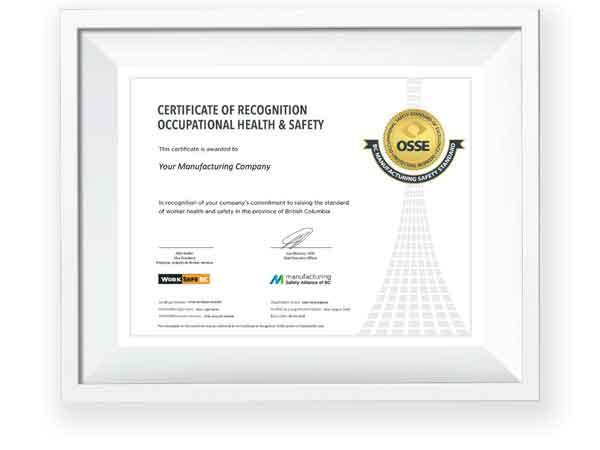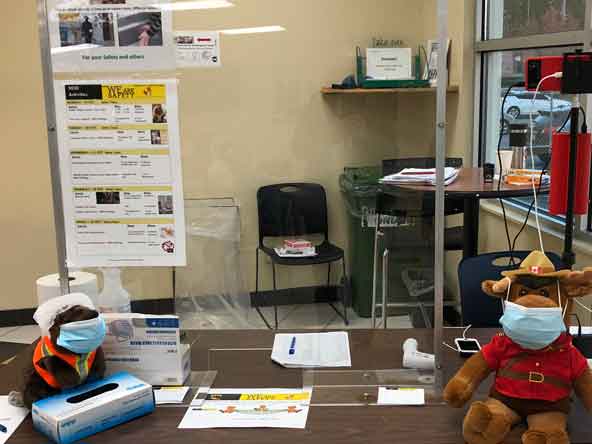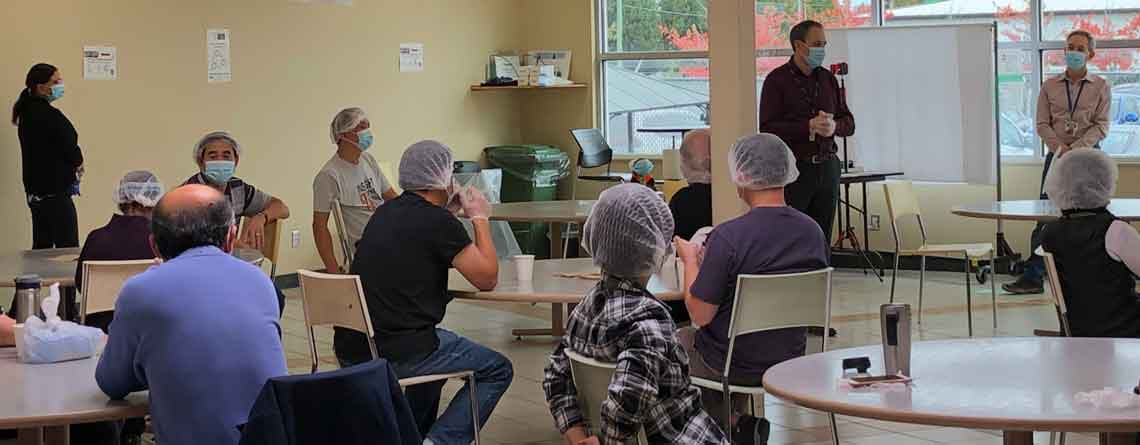OSSE Ongoing: Staying the Course
Kathy Sigstad2021-07-29T14:16:16-07:00Occupational Safety Standard of Excellence (OSSE/COR) certification is a major achievement in establishing an effective health and safety program. But OSSE certification is not a one-time endeavour.
For companies such as Gate Gourmet, the Richmond-based subsidiary of a global foodservice company serving the airline industry, it’s an ongoing process. As Gate Gourmet Operations Manager Kirk Monroe notes, “It’s become part of the way we manage our business.”
OSSE certified since 2010, Gate Gourmet has continued with annual maintenance audits and every-three-year re-certification audits in both OHS and Return to Work for more than a decade. OSSE was recommended to the company to help them build a health and safety program based on best practices, while recapturing some of their WorkSafeBC premium costs through rebates.
Since then, the company has continued to recommit to the program, working the annual goals and action plans from their maintenance audits and re-certification into their way of work.
“It’s a double win for the company,” Kirk says, “Having a health and safety program based on best practices decreases accidents, days lost, and premiums and we receive a WorkSafeBC rebate on top of that when our program is successful.”
“The program really does reduce the number of days employees are off,” Kirk notes, adding, “In our labour market, we just can’t find new people, so getting people back to work quickly is critical. We can’t afford not to have a plan to get people back to work quickly.”
At Gate Gourmet, the company sets goals based on feedback from the previous year’s audit and departments prepare throughout the year for the next maintenance or recertification audit.
“For our unit, it’s become a source of pride,” Kirk adds. “Managers and employees get recognized for their commitment to safety, and I think there’s a lot of satisfaction when the organization sees the rebate. Everyone sees the direct financial benefit to the organization,” he says. “It fosters a culture to live up to, making sure your daily actions align to the standards set out by the program.”


“It’s a double win for the company. Having a health and safety program based on best practices decreases accidents, days lost, and premiums and we receive a WorkSafeBC rebate on top of that when our program is successful”
More than a certification program
Over the years of maintaining their certification, Kirk notes, their program has evolved to “rely more and more on risk assessments to drive decisions, and action plans to address those risks.”
When the pandemic happened, he says, despite the many unknowns, the company treated the hazards related to COVID-19 in much the same way. “Our certified health and safety program gave us a very strong framework,” Kirk says.
“Having a certified, risk-based health and safety system in place and so formalized has created a safety culture employees believed in,” he notes. “That gave our employees a lot of faith in how we handled COVID-19,” he says, adding, “As a result, we had amazing compliance from employees on pandemic control measures.”
Employees wanted the company to keep them safe, and they saw the direct impact of their health and safety program in providing that protection.
The maturity of the company’s health and safety program is paying dividends again with more employees coming back to work in Step 3 of the BC Restart Plan. The airlines have been acting cautiously over the past year and a half, Kirk says. But with restrictions easing, and a restless population looking to travel, he says, business is building quickly. “When they want to ramp up” he adds, “they want it now.”
Although all managers at Gate Gourmet are responsible for health and safety, the company’s health and safety program is a relatively new responsibility for Kirk. Complacency is not something he has had to consider yet.
“When you take on any new role,” he notes, “you come in with a bunch of ideas and ideals to implement.” Success, he says, “comes down to identifying where the gaps and making sure you set aside time to make improvements instead of just the day to day. Coming up with a reasonable, achievable plan.”
From Kirk’s perspective, OSSE “certification helps drive employee retention and recruiting, and helps establish a strong health and safety culture.”
The premium rebate for maintaining certification, he says, “makes the finance guys happy.” And with fewer accidents and lost days, employees see the consistency of the health and safety program.
“It gives them faith that the system’s working, and they know what to expect,” he says. “They know near misses will be investigated, and feedback will be heard. That’s people’s expectation nowadays.”
An advocate for the success of the work, Kirk’s advice to other companies on achieving and maintaining OSSE certification is clear.
“Just do it. You’ve got nothing to lose and everything to gain.”
“For our unit, it’s become a source of pride. Managers and employees get recognized for their commitment to safety, and I think there’s a lot of satisfaction when the organization sees the rebate. Everyone sees the direct financial benefit to the organization. It fosters a culture to live up to, making sure your daily actions align to the standards set out by the program.”



